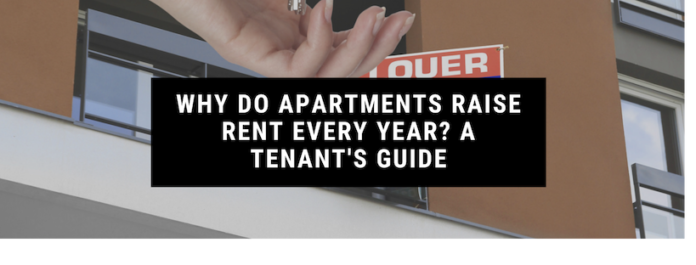It’s a beautiful sunny morning in your downtown apartment. You pour yourself a cup of coffee and proceed to settle down on the couch. You’re upbeat and excited about your upcoming trip to the Bahamas.
You’ve been saving up all year for it. You then notice the pile of unopened mail sitting on your coffee table. One letter, in particular, catches your eye.
You realize it’s the renewal lease from your landlord. As you peruse its contents you learn that he’s raising the rent again! You sit there silently pondering: why do apartments raise rent every year?
Your heart sinks. You’re now faced with a difficult decision. Do you forego your vacation in order to keep the roof over your head, or, do you look for a new place whose rent is right up your alley?
Getting a written notice of rent increase is a stress-inducing reality that you can’t avoid. However, you can find an effective way to deal with it.
This article takes an in-depth look at why apartments increase rent and what you can do about it. Read on.
Why Do Apartments Raise Rent Every Year: Top 4 Reasons
The US reports a median gross rent of $1,012 which increases by an average of more than 5% over a span of 3 years. Therefore, an increase in the cost of housing is nothing new.
But, why does rent increase every year? Some of the reasons include:
Apartments Raise Rent to Match Current Market Rates
Numerous market factors influence the degree to which rent rises. For starters, the cost of property ownership doesn’t remain static. Landlords have to factor in the ever-rising property taxes, municipal rates, landlord insurance premiums and interest rates in their annual rent recalculations.
What’s more, during periods of high inflation, they have to assess their tenants’ affordability. There’s a lot of number crunching that goes on behind the scenes to ensure that the amount the landlord receives in rent is able to not only cover the operating costs but ensure profitability as well.
Property Owners Have to Pay for Maintenance
Landlords bear the sole responsibility of maintaining their rental property. Whether it’s fixing a faulty air conditioner, leaky gas pipe, heating system or a bit of paintwork, they have to foot the cost of all the repairs that take place.
It’s easy to see how these fixes can add up especially if there are multiple tenants residing in a single building. These costs compound over time making it a very expensive affair. Raising the rent is the only way they would be able to afford these costs in the long run.
Property Upgrades Means Higher Rent
In some instances, a landlord may decide to make a number of upgrades to the property in order to improve its market value. In addition to this, new developments in the neighborhood may also contribute to rising rental rates.
These include the construction of a new shopping mall in the neighborhood, a new school or hospital. These establishments make the area more desirable for families and workers which mean that the demand for housing in that region automatically skyrocket.
So can landlord increase rent as a result? The answer to this is a resounding yes they can!
Higher demand ultimately leads to an acute shortage of affordable homes which in turn drives up the cost of housing. If you live in an area that is considered attractive in every sense of the word, then expect your rent to rise every year.
Raising Rent Just Because
Can landlord raise rent just because they can? When all is said and done, you have to realize that they aren’t running a charity organization. It’s their business and hence their source of income.
They do in fact have the right to wake up one day and decide to raise the rent if they feel like it. Unfortunately, they are not legally obligated to give you any reason to justify the increment.
Your Rent’s Gone Up: What to Do About It
While your landlord raising rent is well within their rights, it’s not to say that they can infringe on your fundamental rights. However, you need to be aware of what those rights are in order to mount some defense against rising rent prices. Here are a few ways to go about it:
You Should Receive a Notice of Rent Adjustment
Your landlord cannot increase your rent before your current lease expires. However, if you lease month to month, then they are obligated to provide you with a notice of adjustment.
More often than not, if they are transparent about the process, and, the building you occupy isn’t rent-controlled then, you don’t have any legal basis to challenge their decision to raise the rent.
Negotiate a Multi-Year Lease
A multi-year lease basically locks you into paying your current rent rate for a couple of years. This type of arrangement is a win-win for both parties since you don’t have to worry about your rent going up any time soon, and your landlord reduces the risk of tenancy turnover.
On the flip side, you need to be certain that you love your apartment enough to commit to a multi-year lease. It may prove to be quite difficult to get out of it once you’ve signed on the dotted line.
Do Some Market Research
When you receive your renewal lease with the new rent amount, take the time to do some market research to find out where their asking price stands in relation to other neighboring apartments in the region. This should give you a good idea of whether negotiating the rent amount with your landlord is a plausible alternative.
If the variance is completely off you can (politely) let your landlord know. They may be willing to reconsider the amount before you go apartment hunting for cheaper options.
Offer Your Assistance to Reduce Expenses
Are there services you can offer your landlord that’ll make you stand out from the rest to become a model tenant? Well yes, there are actually.
By offering to make improvements to your apartment building you not only make yourself more desirable as a tenant but you save the landlord money on having to hire someone to do it. Say, for instance, you shovel the building walkway during winter, rake the lawn during fall, or do a mini-facelift on the property by painting the building. All these repairs reduce the overall expenses which in turn mean your landlord may keep your rent constant.
Make Yourself Indispensable
You need to show that you’re not only invaluable but irreplaceable as a tenant. It’s not difficult for a landlord to replace a tenant who’s noisy, reckless and constantly late on rent.
However, if you consistently pay on time, keep your noise levels to a minimum and do a great job keeping your apartment in mint condition, your landlord is more likely to forego a few bucks to ensure your stay put. A good reputation will help you secure the previous year’s rate when the time to renew your lease rolls around.
You can go a step further by being the tenant who always talks to their friends and colleagues about up-coming vacancies in the building. By making referrals, you make yourself an asset your landlord wants to keep by any means necessary, including, keeping your rent the same.
Know Your Tenancy Rights
Tenancy laws may vary from state to state but they exist to protect tenants from being subjected to illegalities by their landlords. Take the time to familiarize yourself with what those laws are. They help answer questions like: When can my landlord raise my rent and by how much?
For instance, landlord-tenant laws dictate how much notice a landlord is obligated to give you before they can raise the rent if you’re on a month to month arrangement. In some states, landlords are prohibited from increasing rent during the first year of tenancy.
Other laws put a cap on the percentage by which your rent can go up. Aside from this, if you feel that your rent was raised perhaps in reprisal to your tenancy, you have the right to seek legal recourse. The take home here is you need to be aware of what the laws are in order to prevent your landlord from taking advantage of your ignorance.
Have a One-On-One Conversation with Your Landlord
If your landlord is acting within the confines of the law, you can talk to them on a human level. Let them know if you’re having some financial difficulties that will make it hard to afford the new cost of rent. This will go a long way especially if it’s an individual and not a corporation that owns your building.
Simply meet with them and negotiate. Who knows, they may reconsider their new rate. If not, well, at least you tried.




















